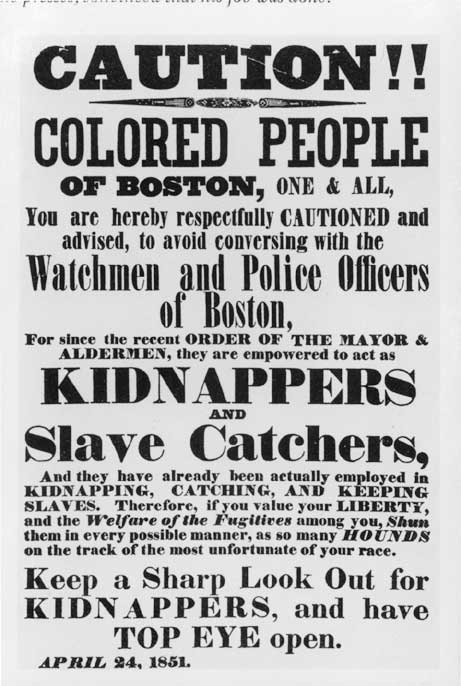
In 1851, a poster was created in Boston, one that was intended to warn Black people in the area. The title, “Caution!! Colored People of Boston!!” draws the attention of colored people that see the poster. The purpose of it is to urge black people in the area to avoid watchmen and police officers that are looking to capture escaped slaves under the Fugitive Slave Act. The different bold fonts on the poster are very eye-catching and is something like a form of protest as well as commanding the attention of the targeted audience. The poster draws the attention to the threat of legal kidnapping under the terms of the Fugitive Slave Act. Though, the exact creator of this post is not known, the purpose is to alert the Black community that their safety is in danger. At this time many enslaved people were being captured therefore the poster was created for this not to happen to others. For context, the Fugitive Act of 1850 is two federal laws passed by the U.S. Congress that allowed for the capture and return of slaves that had escaped from one state to another.
The Fugitive Slave Act of 1850 was only a small piece of the bigger picture which was the Compromise of 1850. The Compromise of 1850 is a combination of five laws that were put into place in order to ease conflict between free states and slave states over the issue of slavery. The purpose was to make Southern slaveholders happy by enforcing their claims towards slaves even in free states. In Boston this created a lot of outrage which led to resistance.
This resistance can even be observed in the poster such as the word formatting. For instance, “CAUTION!!” in large bold letters show that the poster is meant to stand out to the public eye but instead of enforcing to the law it is meant to warn people from it. The warning really highlights how dangerous it would be for Black people to be seen being that they could legally be captured. The poster also accuses police of working with slave catchers which shows how everyone was against Black people at this time.
Abolitionists in Boston formed groups such as the Vigilance Committee which helped protect black people as well as help them to escape to safety. There were also a lot of activists and public figures that spoke up about the issue. For example, Kevin McMullen wrote about Walt Whitman’s anger about the Fugitive Slave Act (insert evidence)
In present day this historical source allows us to understand that black people resisted oppression and how communities united to warn and protect one another. This poster is a powerful reminder that resistance did not only come through speeches and battles, but also through everyday acts of defiance like spreading information. It reflects the urgency and fear that gripped free Black communities, as well as their courage to organize against injustice. Today, it stands as a testament to the strength and resilience of those who fought against systemic oppression, even in the face of legal threats.